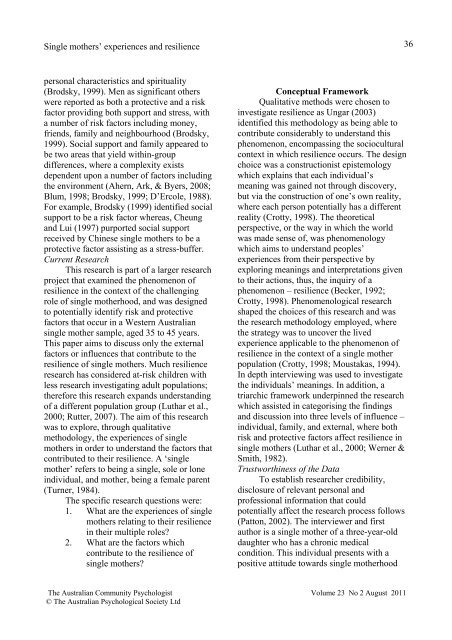The Australian Community Psychologist - APS Member Groups
The Australian Community Psychologist - APS Member Groups
The Australian Community Psychologist - APS Member Groups
You also want an ePaper? Increase the reach of your titles
YUMPU automatically turns print PDFs into web optimized ePapers that Google loves.
Single mothers’ experiences and resilience<br />
36<br />
personal characteristics and spirituality<br />
(Brodsky, 1999). Men as significant others<br />
were reported as both a protective and a risk<br />
factor providing both support and stress, with<br />
a number of risk factors including money,<br />
friends, family and neighbourhood (Brodsky,<br />
1999). Social support and family appeared to<br />
be two areas that yield within-group<br />
differences, where a complexity exists<br />
dependent upon a number of factors including<br />
the environment (Ahern, Ark, & Byers, 2008;<br />
Blum, 1998; Brodsky, 1999; D’Ercole, 1988).<br />
For example, Brodsky (1999) identified social<br />
support to be a risk factor whereas, Cheung<br />
and Lui (1997) purported social support<br />
received by Chinese single mothers to be a<br />
protective factor assisting as a stress-buffer.<br />
Current Research<br />
This research is part of a larger research<br />
project that examined the phenomenon of<br />
resilience in the context of the challenging<br />
role of single motherhood, and was designed<br />
to potentially identify risk and protective<br />
factors that occur in a Western <strong>Australian</strong><br />
single mother sample, aged 35 to 45 years.<br />
This paper aims to discuss only the external<br />
factors or influences that contribute to the<br />
resilience of single mothers. Much resilience<br />
research has considered at-risk children with<br />
less research investigating adult populations;<br />
therefore this research expands understanding<br />
of a different population group (Luthar et al.,<br />
2000; Rutter, 2007). <strong>The</strong> aim of this research<br />
was to explore, through qualitative<br />
methodology, the experiences of single<br />
mothers in order to understand the factors that<br />
contributed to their resilience. A ‘single<br />
mother’ refers to being a single, sole or lone<br />
individual, and mother, being a female parent<br />
(Turner, 1984).<br />
<strong>The</strong> specific research questions were:<br />
1. What are the experiences of single<br />
mothers relating to their resilience<br />
in their multiple roles?<br />
2. What are the factors which<br />
contribute to the resilience of<br />
single mothers?<br />
Conceptual Framework<br />
Qualitative methods were chosen to<br />
investigate resilience as Ungar (2003)<br />
identified this methodology as being able to<br />
contribute considerably to understand this<br />
phenomenon, encompassing the sociocultural<br />
context in which resilience occurs. <strong>The</strong> design<br />
choice was a constructionist epistemology<br />
which explains that each individual’s<br />
meaning was gained not through discovery,<br />
but via the construction of one’s own reality,<br />
where each person potentially has a different<br />
reality (Crotty, 1998). <strong>The</strong> theoretical<br />
perspective, or the way in which the world<br />
was made sense of, was phenomenology<br />
which aims to understand peoples’<br />
experiences from their perspective by<br />
exploring meanings and interpretations given<br />
to their actions, thus, the inquiry of a<br />
phenomenon – resilience (Becker, 1992;<br />
Crotty, 1998). Phenomenological research<br />
shaped the choices of this research and was<br />
the research methodology employed, where<br />
the strategy was to uncover the lived<br />
experience applicable to the phenomenon of<br />
resilience in the context of a single mother<br />
population (Crotty, 1998; Moustakas, 1994).<br />
In depth interviewing was used to investigate<br />
the individuals’ meanings. In addition, a<br />
triarchic framework underpinned the research<br />
which assisted in categorising the findings<br />
and discussion into three levels of influence –<br />
individual, family, and external, where both<br />
risk and protective factors affect resilience in<br />
single mothers (Luthar et al., 2000; Werner &<br />
Smith, 1982).<br />
Trustworthiness of the Data<br />
To establish researcher credibility,<br />
disclosure of relevant personal and<br />
professional information that could<br />
potentially affect the research process follows<br />
(Patton, 2002). <strong>The</strong> interviewer and first<br />
author is a single mother of a three-year-old<br />
daughter who has a chronic medical<br />
condition. This individual presents with a<br />
positive attitude towards single motherhood<br />
<strong>The</strong> <strong>Australian</strong> <strong>Community</strong> <strong>Psychologist</strong> Volume 23 No 2 August 2011<br />
© <strong>The</strong> <strong>Australian</strong> Psychological Society Ltd

















